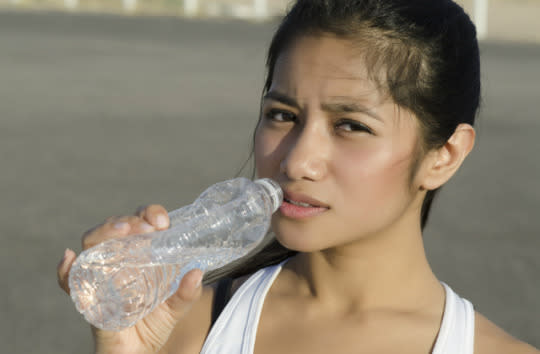Hot weather dos and don’ts for your health
As the warm weather continues to persist this week, keep these health tips in mind whether you’re outdoors or staying indoors.
By Hong Xinying

Image: Shutterstock
The heatwave has eased up a bit this week with short-interval thundery showers expected.
However, significantly warmer temperatures are still likely this week, with daily maximum temperature averaging between 33°C to 35°C, based on the Meteorological Service Singapore (MSS) forecast.
The highest daily maximum temperature recorded recently was 36.7 deg at Seletar on 13 Apr, said the National Environment Agency (15 April). It’s the highest in the last 10 years; the highest daily maximum temperature (36 degrees) was last recorded on 26 March 1998 by MSS.
An advisory sent by the authorities on 20 Apr urged the public to take precautions to minimise their risk of heat-related illnesses. The statement was issued jointly by National Environment Agency (NEA) as well as the ministries of Manpower, Social and Family Development, Health and Education.
Although April is the warmest month in the year, “the prevailing strong-to-moderate El Nino is a contributing factor to the current warm conditions,” said the advisory. However, the temperature “is not likely to reach 40°C, due to the moderating effect of our surrounding seas on the temperature,” it added.
During these hot days, it’s best to avoid staying outdoors for prolonged periods.
“Prolonged exposure can affect your health as it can cause burn injuries and dehydration,” explains Dr Lim, a family physician at Lifescan Medical Centre. Strenuous exercise outdoors should also be discouraged.
As such, it’s advisable to seek the shade where possible and dress appropriately for the warm weather. “Wear lightweight, light-coloured and loose fitting clothes,” advises the doctor.
Here, he shares a few more helpful tips to know.
1. Drink water frequently, even when you are not feeling thirsty
By the time you feel thirsty, you are already experiencing dehydration. This is a sign that your body is losing more fluids than it takes in.
Besides that acute feeling of thirst, a good gauge of hydration would be from observing the urine colour. “Ideally, urine should be clear or light yellow,” says Dr Lim.
The exact amount that you should consume however, varies from individual to individual. It’s dependent on factors such as your body weight, height, the drinks you consume and your exercise habits.
You can also use hydration calculators such as this online, to help gauge if your daily consumption is adequate.
2. Apply sunblock on your skin frequently
Do not wait until you’re outdoors and your skin is already exposed to the sun to apply sunblock on your skin. Sunblock should be applied before you start any physical activity, be it walking outdoors or going cycling.
Here’s a good habit to keep: reapply sunblock every two hours, as your perspiration may wash off the sun protection it offers.
“Long-term sun exposure can lead to a wide range of detrimental health effects like skin cancer, premature ageing and cataracts (clouding of the lens in your eye),” explains Dr Lim.
3. Drink less alcoholic or caffeinated drinks
Choose plain water or isotonic drinks over beverages such as coffee, tea, wine and beer, says the doctor.
Drinks with caffeine or alcohol content are diuretic, which means that these will cause you to lose body fluids faster as you urinate more frequently. If you can’t do without your daily cup of coffee, make up for the fluids lost by drinking more water.
4. Watch out for family members at high risk of heat-related illnesses
Vulnerable groups include pregnant women, the elderly and young children, warns Dr Lim.
During pregnancy, women need more water to aid the healthy development of the foetus. Due to ageing, the elderly are less able to conserve water in their body; the feeling of thirst may also be blunted by age.
The young may also be more susceptible to heat-related illnesses. “Young children (children under the age of 12) are more at risk as they produce more heat with activity and perspire less,” explains the doctor.
“It is also common for children to forget about drinking enough fluids whenever they are engaged in a fun activity,” he adds.
So keep an eye on your kids, to make sure that they stay healthily hydrated.
5. Be aware of symptoms of heat-related injuries
These symptoms include nausea, giddiness, dizziness, dry mouth and headaches. You may also feel faint or lightheaded, easily fatigued and experience muscle cramps.
“In serious cases, such heat-related injuries can progress to heat stroke,” says Dr Lim.
It is highly recommended that you rest and start drinking more water as soon as possible, when the signs of heat-related illnesses start to show.
“Heat stroke is a medical emergency and is potentially life threatening,” explains Dr Lim. “Patients affected with heatstroke have a high body temperature, an inability to sweat properly and confusion, coma or delirium. It can also lead to multiple organ failure.”
Do seek immediate medical attention, if signs of heat stroke are evident.

